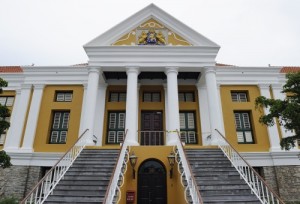Court ruling hits income medical specialists in Curacao

WILLEMSTAD – Medical specialists in Curacao are subject to the national ordinance that regulates the top incomes of employees at government-related entities, the Court in First Instance ruled on June 14. This means that, after a transition period, medical specialists who are on the payroll of the Curacao Medical Center (CMC) cannot earn more than 386,000 guilders ($215,642) per year.
The court ruled that the CMC is subject to the National Ordinance Standardization Top Incomes because it considers the hospital as a government-associated entity.
The ruling does not necessarily have consequences for specialists who work at the St. Maarten Medical Center because this hospital describes itself as a private non-profit organization. In 2013, the World Health Organization wrote in an assessment of the country’s mental health system: “There are no government-run medical facilities of any kind on St. Maarten.”
In Curacao, the situation is therefore different, but the CMC contested the decision to subject its specialists to the national ordinance in court, together with the National Association of Medical Professionals In Employment.
According to the court ruling, specialists on CMC’s payroll currently earn between 300,000 ($167,598) and 660,000 guilders ($368,715) per year. When Curacao introduced the ordinance aimed at bringing top incomes more or less in line with the income of the prime minister on December 21, 2022, the salary cap was set at 295,000 guilders (around $164,804). Per July 1 of this year, the cap increases to 386,000 guilders ($215,642). The top-earning specialist therefore will have to give up $153,073 of their current income, a decrease of 41.5 percent. The government is, however, prepared to talk about another increase of the salary cap by 30 percent to 501,000 guilders ($279,888). That would soften the blow a bit, but top-earning specialists would still lose $88,827 or 24 percent of their income
The court states in its ruling that its decision does not violate higher legislation or general principles of law. It denied the demand by CMC and the medical professionals that the national ordinance does not apply to them and ruled that executing the ordinance is not unlawful.
HNO Transitie en Exploitatie NV, the entity that does business as Curacao Medical Center, based its demands among others on the argument that subjecting its specialists to the national ordinance is unacceptable because it would result in dire consequences for the CMC and for the healthcare system in Curacao.
The court found that HNO Holding was established by the government of Curacao and that the appointment and dismissal of management and supervisory board members fall under the authority of the Minister of Public Health. The government is the owner of the shares in CMC. “Therefore CMC must be considered as a company as described in the national ordinance corporate governance; it meets the definition of a government-associated entity. The national ordinance standardization of top incomes, therefore, applies to the CMC.”
CMC’s call on the principle of equality failed. It argued that the ordinance does not apply to those who work for the psychiatric hospital Capriles, the Advent Hospital, general practitioners, physiotherapists, and independently established specialists. The court dismissed this argument, pointing out that the ordinance only applies to the government and government-associated entities and not to independently established specialists. In 2013, Curacao outlawed medical specialists who aim to treat BZV-insured patients to establish themselves as independent practitioners.


























